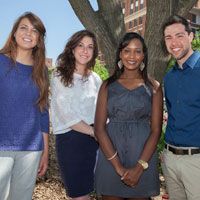
Alex Fortenko, M.P.H. ‘11, a first-year medical student in the George Washington University School of Medicine and Health Sciences (SMHS), says it’s a minor miracle when he catches a meal outside of Ross Hall. Between classes, exams, and studying, grocery shopping sinks to the bottom of the to-do list.
That’s why when Fortenko and his classmates get a spare moment, they’re thankful to have a Whole Foods, Trader Joes, Safeway, and, on Wednesdays, a farmer’s market, all within a few blocks.
But across the city, the landscape is drastically different, as Fortenko and fellow first-year medical students Merissa Garvey, Annie Kennelly, and first-year student in the Milken Institute School of Public Health (formerly the GW School of Public Health and Health Services) Laura Schmucker found when they volunteered in Anacostia as a part of GW’s Interdisciplinary Student Community-Oriented Prevention Enhancement Service (ISCOPES) program.
The area has few grocery stores, and even those appear to sell more liquor than produce, the group noticed when visiting the neighborhood. They were also struck by the in-house nursery at the local high school — a testament to the area’s high teen pregnancy rate.
“We hear a lot of global health problems, but there are so many issues here in Washington, D.C., that need to be looked at,” said Garvey. “There are people suffering literally down the street.”
“Once we saw the disparities, we started to think about ways we could help,” added Fortenko.
It didn’t take long for the group to settle on an idea—now a project called GROW DC—that aims to reduce nutritional disparities among infants and toddlers in Ward 8, where 30 percent of children live in poverty.
Their initiative, which was featured during this year’s Clinton Global Initiative University (CGI U) at GW, will distribute low-cost, nutritious food to infants and toddlers of Ward 8 and educate mothers about how to make good nutrition choices for their families. Their goal is to reach children before they are of school age.
More than handing out healthy food, GROW DC is committed to making their impact sustainable. The team plans to use text messaging to keep participants engaged by sending nutrition tips, information on local nutrition resources, and even quiz questions that direct them to answers on social media websites.
“We want them to be just as engaged in the project as we are,” said Schmucker. “We want to ingrain good habits in these kids and mothers.”
By focusing on the area’s youngest — zero to three-year-olds — GROW DC strives to make an impact during some of the most critical developmental and habit-forming years of life. The students also hope to fill a gap left by other area interventions like DC’s Overweight and Obesity Action Plan and the National School Lunch Program, which only reach children once they have entered the school system.
“We realized there was a big issue with nutrition in Ward 8, and especially for children before they enter elementary school,” said Garvey, who conducted research in pediatric nutrition before enrolling in medical school. “They are lacking that strong foundation.”
The group’s idea became reality this spring, when they attended CGI U, a national forum for select students, national youth organizations, topic experts, and celebrities to develop solutions some of the world’s most pressing problems. Over the forum’s three days, Fortenko, Garvey, Kennelly, and Schmucker consulted with community health leaders, networked with members of the media, developed partnerships with like-minded students, and even presented their project on stage in front of thousands of people — a rare honor only afforded to a handful of participants.
“Participating in CGI U really solidified that there’s a lot of excitement around this,” said Kennelly. “It also made us think about the project critically, like what steps we need to take in terms of funding and how the program should be structured.”
The team expects the momentum to only build from here. Throughout the summer, they will build relationships with area organizations like DC Central Kitchen and the Capital Area Food Bank, apply for funding through grants, seek partnerships with national food companies, and spread the word about their mission.
Come fall, GROW DC plans to launch their first intervention at Anacostia High School, where they will be able to reach a significant segment of the area’s young mothers. “There are about 100 moms at the school, so we think it’s a good place to start,” said Garvey.
But it won’t stop there. Eventually, the team hopes that their project will span the city, with teams of students going into schools and community-based organizations to distribute food and educate residents. They envision GROW DC becoming a GW staple like the Healthcare, Education, and Active Living (HEALing) Clinic that involves health professional students from all classes.
“We are still at the very beginning of this project,” said Fortenko, “But we have high hopes for where it will go.”


